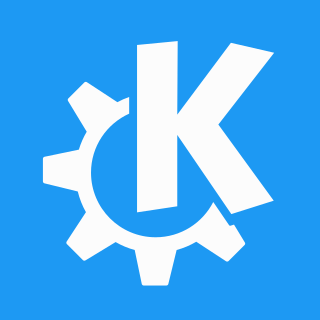
Konqueror is a free and open-source web browser and file manager that provides web access and file-viewer functionality for file systems. It forms a core part of the KDE Software Compilation. Developed by volunteers, Konqueror can run on most Unix-like operating systems. The KDE community licenses and distributes Konqueror under GNU GPL-2.0-or-later.
A browser engine is a core software component of every major web browser. The primary job of a browser engine is to transform HTML documents and other resources of a web page into an interactive visual representation on a user's device.

Safari is a web browser developed by Apple. It is built into Apple's operating systems including macOS, iOS, and iPadOS, and uses Apple's open-source browser engine WebKit, which was derived from KHTML.

KHTML is a browser engine developed by the KDE project. It is the default engine of the Konqueror browser, but it has not been actively worked on since 2016. Moreover, KHTML will be discontinued for KDE Frameworks 6.

KDevelop is a free and open-source integrated development environment (IDE) for Unix-like computer operating systems and Windows. It provides editing, navigation and debugging features for several programming languages, and integration with build automation and version-control systems, using a plugin-based architecture.
Harri Porten is a software engineer. Porten, a KDE developer and former Trolltech employee, is the CEO of Froglogic, a consultancy company related to Qt development. He lives in Hamburg, Germany.
WebKit is a browser engine developed by Apple and primarily used in its Safari web browser, as well as all web browsers on iOS and iPadOS. WebKit is also used by the PlayStation consoles beginning from the PS3, the Tizen mobile operating systems, the Amazon Kindle e-book reader, Nintendo consoles beginning from the 3DS Internet Browser, and the discontinued BlackBerry Browser. WebKit's C++ application programming interface (API) provides a set of classes to display Web content in windows, and implements browser features such as following links when clicked by the user, managing a back-forward list, and managing a history of pages recently visited.
A JavaScript engine is a software component that executes JavaScript code. The first JavaScript engines were mere interpreters, but all relevant modern engines use just-in-time compilation for improved performance.
This is a comparison of widget engines. This article is not about widget toolkits that are used in computer programming to build graphical user interfaces.

KDE Plasma 4 was the fourth generation of the KDE workspace environments. It consisted of three workspaces, each targeting a certain platform: Plasma Desktop for traditional desktop PCs and notebooks, Plasma Netbook for netbooks, and Plasma Active for tablet PCs and similar devices.
Apache Cordova is a mobile application development framework created by Nitobi. Adobe Systems purchased Nitobi in 2011, rebranded it as PhoneGap, and later released an open-source version of the software called Apache Cordova. Apache Cordova enables software programmers to build hybrid web applications for mobile devices using CSS3, HTML5, and JavaScript, instead of relying on platform-specific APIs like those in Android, iOS, or Windows Phone. It enables the wrapping up of CSS, HTML, and JavaScript code depending on the platform of the device. It extends the features of HTML and JavaScript to work with the device. The resulting applications are hybrid, meaning that they are neither truly native mobile application nor purely Web-based. They are not native because all layout rendering is done via Web views instead of the platform's native UI framework. They are not Web apps because they are packaged as apps for distribution and have access to native device APIs. Mixing native and hybrid code snippets has been possible since version 1.9.

Maciej Stachowiak is a Polish American software developer currently employed by Apple Inc., where he is a leader of the development team responsible for the WebKit Framework. A longtime proponent of open source software, Stachowiak was involved with the SCWM, GNOME and Nautilus projects for Linux before joining Apple. He is actively involved the development of web standards, served as a co-chair of the World Wide Web Consortium's HTML 5 working group and was a member of the Web Hypertext Application Technology Working Group steering committee.
Titanium SDK is an open-source framework that allows the creation of native mobile applications on platforms iOS and Android from a single JavaScript codebase. Titanium SDK is presently developed by non-profit software foundation TiDev, Inc.

The KDE Software Compilation was an umbrella term for the desktop environment plus a range of included applications produced by KDE. From its 1.0 release in July 1998 until the release of version 4.4 in February 2010, the Software Compilation was simply known as KDE, which stood for K Desktop Environment until the rebrand. The then called KDE SC was used from 4.4 onward until the final release 4.14 in July 2014. It consisted of the KDE Plasma 4 desktop and those KDE applications, whose development teams chose to follow the Software Compilation's release schedule. After that, the KDE SC was split into three separate product entities: KDE Plasma, KDE Frameworks and KDE Applications, each with their own independent release schedules.
A browser speed test is a computer benchmark that scores the performance of a web browser, by measuring the browser's efficiency in completing a predefined list of tasks. In general the testing software is available online, located on a website, where different algorithms are loaded and performed in the browser client. Typical test tasks are rendering and animation, DOM transformations, string operations, mathematical calculations, sorting algorithms, graphic performance tests and memory instructions. Browser speed tests have been used during browser wars to prove superiority of specific web browsers. The popular Acid3 test is no particular speed test but checks browser conformity to web standards.

rekonq was a lightweight, QtWebKit-based web browser developed inside the free software project KDE. It is the default web browser of Chakra GNU/Linux, and was formerly of Kubuntu. rekonq has been officially included in KDE Extragear since 25 May 2010. In contrast to Konqueror, a web browser and file manager also developed by KDE, rekonq aims to be a standalone and simple web browser. Its code was initially based on Qt Development Frameworks' QtDemoBrowser and is developed on KDE Projects' Git repository.

Ember.js is an open-source JavaScript web framework that utilizes a component-service pattern. It allows developers to create scalable single-page web applications by incorporating common idioms, best practices, and patterns from other single-page-app ecosystem patterns into the framework.
Blink is a browser engine developed as part of the Chromium project with contributions from Google, Meta, Microsoft, Opera Software, Adobe, Intel, IBM, Samsung, and others. It was first announced in April 2013.

KDE Projects are projects maintained by the KDE community, a group of people developing and advocating free software for everyday use, for example KDE Plasma and KDE Frameworks or applications such as Amarok, Krita or Digikam. There are also non-coding projects like designing the Breeze desktop theme and iconset, which is coordinated by KDE's VisualDesignGroup. Even non-Qt applications like GCompris, which started as a GTK-based application, or web-based projects like WikiToLearn are officially part of KDE.








